Friedrich Siems: Theatre Director in the Skipton Camp
The story of Friedrich Siems, who directed the theatre in the camp, has been researched by Harriet Purbrick, a University of Leeds History student who has won a Laidlaw Scholarship to work on the Skipton POW camp project for two years.
Friedrich Siems was captured on 20 July 1918 at the Battle of Tardenois, 20 kilometres south west of Riems. According to his Red Cross records he had a severe gunshot wound to his left hand and another gunshot wound to his abdomen. He was initially taken to Belmont Hospital in Surrey before being transferred to Skipton on 4 September.
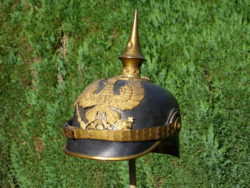
Friedrich Siems' helmet (photo Alex Siems)
After the war, Siems went on to become a well-known actor and theatre director in Germany. Information provided by his nephew Alex Siems in addition to articles and reviews in German national newspapers have allowed us to piece together his career.
It is probably no coincidence that the Raikeswood Camp theatre was founded in September 1918, the same month that Siems arrived at Skipton, The theatre put on at least 23 different plays before the prisoners were repatriated in October 1919. Siems acted in several plays, such as Bernard Shaw’s The Doctor’s Dilemma and Wilde’s The Importance of Being Earnest, in which he took the female role of Cecily Cardew as there were no women in the camp.
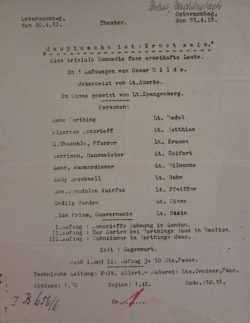
Programme from the Skipton POWs' production of The Importance of being Earnest
Siems’ became a professional actor after repatriation, initially acting in a couple of silent films, Aus der Jugendzeit (1921) and Dunkle Gewalten (1924). The 1920s was a significant era for German film: German expressionism was at its peak and internationally renowned directors including Fritz Lang attempted to express the emotional turmoil caused by the humiliating defeat in the war through progressive, surrealist methods.
But it was on the stage where Siems found his real passion. Returning to his hometown of Hamburg, Siems launched his theatre career acting in a number of chamber plays. From 1926-27, he performed in Stuttgart, at the regional theatre of Baden-Württemberg. He then pivoted his career to focus mainly on directing. Siems already had some experience directing theatre: whilst still at Skipton, he directed the POWs in a series of German comedies. In 1935 Siems directed comedy again at the comedy theatre in Berlin. Siems’ directing career went from strength to strength, taking him to theatres all over Germany as well as abroad. He worked on the annual Luisenburg-Festspiele, a prestigious festival, ongoing to this day, which showcases theatre in Germany’s oldest open air theatre. For a brief period, Siems was a director at the renowned Estates Theatre in Prague.
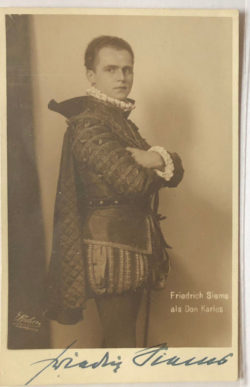
Friedrich Siems as Don Carlos in the play by Schiller
In 1948, when he was in his 50s, Siems settled into his role that he remains most famous for: artistic director of the theatre of Cologne. According to an article in the German newspaper die Zeit, the Cologne theatre under Siems’ creative control was renowned for its artistic merit throughout Germany. Here he directed some of the most highly regarded plays such as Shakespeare’s Hamlet and Ibsen’s The Wild Duck as well as overseeing the annual Luisenburg-Festspiele.
Siems did not just revive theatrical classics, he also showed no fear in adapting poems for the stage, receiving particular praise for his direction of a stage version of W.H Auden’s The Age of Anxiety. Nor was Siems phased by an unofficial boycott of the works of Bertolt Brecht in Western Germany – Brecht was seen to have chosen East Germany over the West, deeply problematic at the height of the Cold War. Siems’ version of Life of Galileo was said to have been a breakthrough in the boycott.
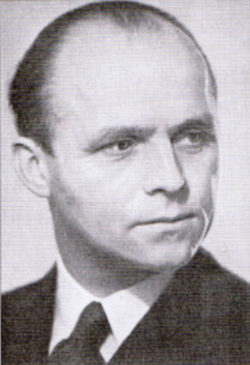
We gain an insight into how Siems worked as an artistic director in Cologne from an account right at the end of his career by a writer and once struggling actor named Michael Buselmeier. Meeting Siems for the first time in November 1963, Buselmeier remembers him as “more like a wise old painter than a man of the theatre.” To Buselmeier, who was attending countless auditions without success, Siems appeared in front of him as a “beacon of hope”. Siems saw the potential in Buselmeier when he was about to give up on his acting career. He drew up an acting contract for him and signed it on the last day of his life.
In December 1963, Siems died of a sudden heart attack in the environment he had spent most of his life, at a theatre in Tuebingen during the rehearsals for Hamlet.
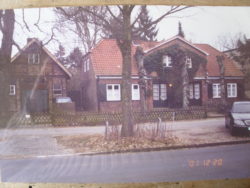
The house in Hamburg where Friedrich Siems was born. The small building is the smithy where his father worked as a blacksmith. (photo: Alex Siems)
Thanks to Corinna Meiss from Woerteragentur for her help with our research.
